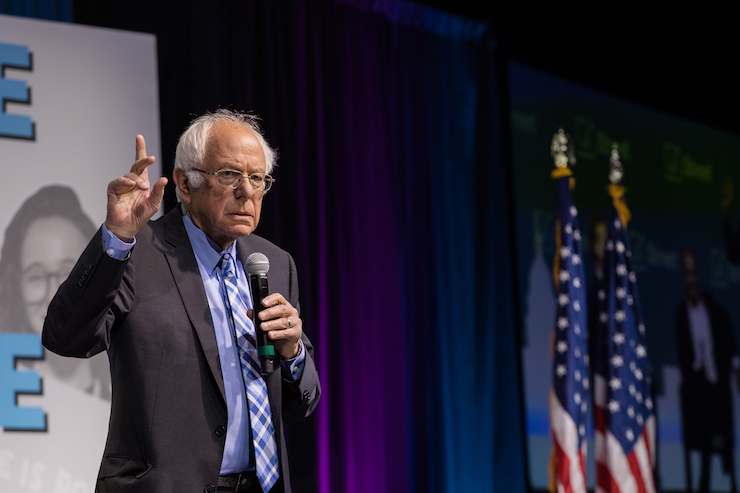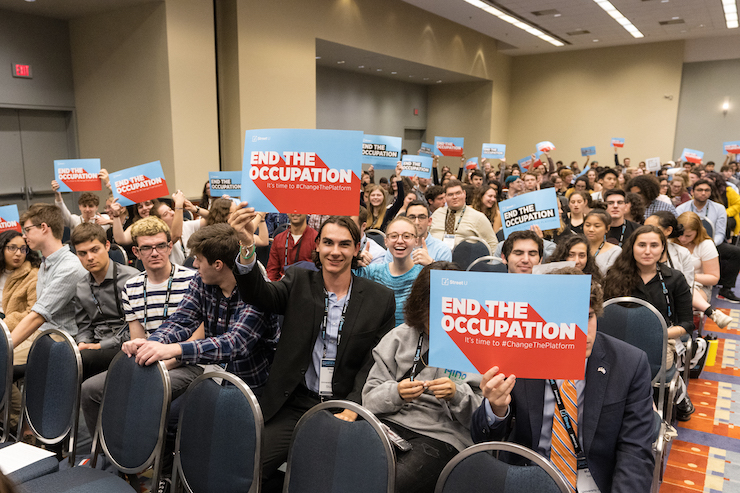
What at first looked like a sea change on the horizon has turned out to be much less. One week after Democratic presidential candidates discussed conditioning U.S. military aid to Israel at J Street’s national conference in Washington, the liberal pro-Israel group makes clear that it continues to support unconditional aid, despite ongoing Israeli human rights abuses and settlement expansion.
A statement issued Monday by J Street affirms the group’s commitment to maintaining Israel’s qualitative military edge over other states and non-state actors in the region — a commitment that is also codified in U.S. law. Though the statement added that “the U.S. has a right and responsibility to examine the uses to which American aid is put” and that “the U.S. should not foot the bill for annexation,” the statement also stressed: “this is not a call to reduce the level of U.S. security assistance or to ‘condition aid.’”
The only listed circumstance under which J Street would support altering the terms of U.S. military aid to Israel is formal annexation of all or parts of the West Bank. The group’s statement makes no mention of Israel’s de facto annexation of the occupied West Bank through continued settlement construction, the forced population transfer of Palestinians out of Area C of the West Bank, or the extension of Israeli sovereignty to educational institutions in West Bank settlements. In fact, the word “settlements” does not appear once in the group’s statement.
The impression from J Street’s statement is that its decision was informed more by domestic political considerations and internal organizational politics than by a concern for Palestinian human rights. In justifying its opposition to tying military aid to the behavior of the Israeli government, the organization explicitly names the need to defeat Donald Trump in the 2020 elections and the importance of not being construed as “anti-Israel.”
It is perhaps not a coincidence that J Street released its statement only a few hours after the Republican Jewish Coalition (RJC) launched a $10 million campaign with an ad titled “Democrats Are A Shanda” (shame or embarrassment in Yiddish), attacking the Democratic presidential candidates for their comments about conditional aid at the J Street conference.
Polling conducted by J Street itself shows not only strong opposition among American Jews to continued settlement expansion but also a clear preference for a presidential candidate who would place criteria on how Israel uses U.S. funds, yet the group appears concerned that support for conditional aid to Israel could hurt Democrats’ chances in the upcoming elections if Republicans continue to run ads like the RJC’s. JStreetPAC, the group’s political action committee, is a significant player in U.S. electoral politics and heavily invested in supporting Democratic candidates: in the 2018 midterms, it distributed nearly $5 million across 163 candidates running for Congress.
If the recent past is any indication, refusing to support conditional aid is unlikely to prevent those in the right-wing pro-Israel community from labeling J Street as “anti-Israel.” In 2014, for example, J Street took a strong public stance in opposition to the boycott, divestment and sanctions (BDS) movement. That did not stop the Conference of Presidents of Major Jewish Organizations — an umbrella group founded to lobby in support of the Israeli government and express American Jewry’s “consensus support for Israel” — from rejecting J Street’s bid for membership.
J Street is also facing criticism to its left, though it appears less inclined to take this criticism as reason to change its policy positions. “J Street shields Israel from accountability for its ongoing violations of human rights by supporting unconditional U.S. military funding to Israel,” a group of Palestinian activists wrote prior to J Street’s conference. “J Street dismisses our voices and our demands, pushing instead its agenda in liberal and progressive circles in ways that are harmful to our advocacy to hold Israel accountable.”
Rabbi Alissa Wise, co-executive director of Jewish Voice for Peace (JVP), which supports BDS, said that J Street’s refusal to support conditional aid confirmed for her “that they’re not going to lead on this.”
“Palestinian rights are not their priority, the two-state solution is,” she continued. “It’s not about peace, it’s not about human rights, it’s about this solution that many think is already off the table.”
Perhaps another reason for J Street’s position, Wise speculated, is the fear that support for conditional aid could lead to greater acceptance of the BDS movement. “If you take conditioning aid to its logical conclusion, you find the boycott, divestment, sanctions movement,” she said. Both conditional aid and BDS are, at their core, about holding Israel accountable for its actions, a notion that J Street has so far refused to endorse in practice.

The clearest example of this, after declining to support conditioning aid, is J Street’s refusal to support House Bill 2407. Introduced in May by Minnesota Rep. Betty McCollum, the bill seeks to prevent the Israeli army’s use of U.S. funds in detaining Palestinian children. The bill does not call for withholding U.S. military support to Israel but rather for redirecting U.S. subsidies, yet J Street representatives told +972 Magazine’s Mairav Zonszein last week that they feared the bill “would function to significantly reduce, if not zero out, U.S. security assistance to Israel, which we support.”
Logan Bayroff, J Street’s director of communications, confirmed Tuesday that the group does not support or oppose the bill. But some Palestinian rights advocates working to garner support for H.2407 on Capitol Hill said they felt J Street was impeding support for the bill from progressive members of Congress. J Street had initially said it would back the bill before expressing concerns about its wording.
Even after decades of creeping annexation and settlement expansion, J Street appears unwilling to back putting material pressure on the Israeli government to change its policies. It remains committed to realizing a two-state solution that, in part due to its own inaction, grows less feasible with every passing day, if it can still be said to be feasible at all. By setting formal annexation as its red line, J Street is, in effect, sending the message that as long as the status quo continues, Israel will face no serious consequences for the brutality that this one-state reality entails — home demolitions, child detentions, checkpoints, routine settler violence, and endless military rule.
“If you are interested in preventing human rights abuses and other gross violations of international law,” said Brad Parker, senior policy and advocacy adviser at Defense of Children International—Palestine, “there are all kinds of ways to eliminate the blank check and place conditions on ongoing issues like settlement expansion or systematic, institutionalized ill-treatment of children in a military detention system.”
For the time being, it seems J Street is not that interested.

